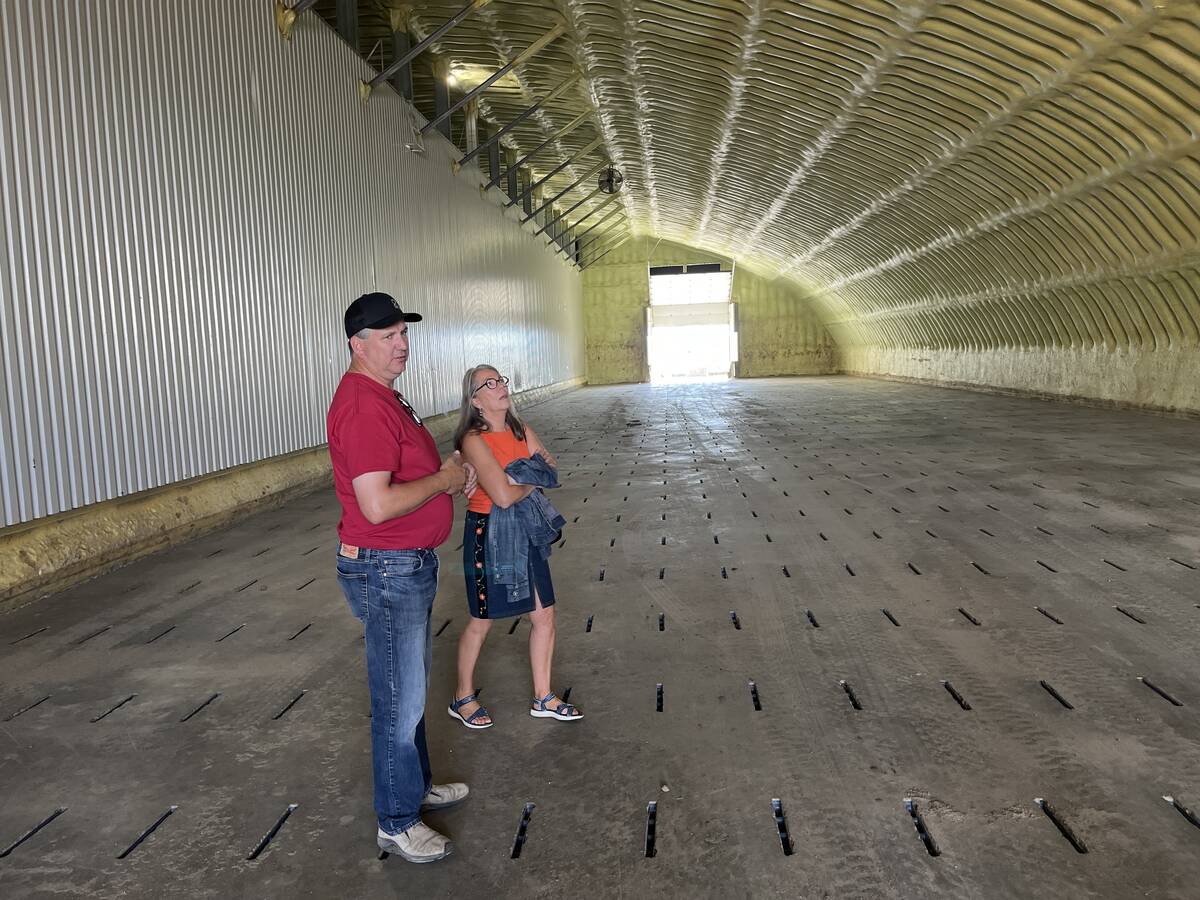In France they fill and roll their omelettes, in China they chop and add them to a stir fry and in Italy they cut them in wedges as frittatas. The possibilities are endless with eggs and many dishes can be prepared in minutes.
Eggs are an excellent source of high quality protein containing all the nine essential amino acids (the ones the body must get from food sources), as well as
vitamins A, D, E, B and minerals such as calcium, phosphorus, magnesium, iron and zinc.
Read Also

Potato farm requires year-round management
The most recent Open Farm Day in Alberta showcased agricultural producers across the province educating the general public about the process that is required is to get food to their table.
The one concern is the amount of cholesterol they contain. Most normal healthy people can eat eggs in moderation without a harmful rise in blood cholesterol because in most cases the
cholesterol you eat has little
effect on the amount in your blood. It is the total amount of fat in food that is the concern, not just the amount of cholesterol. But maintain variety in your diet. Just as you wouldn’t eat beef or ice cream every day, neither should you eat eggs daily.
However, those with very high blood cholesterol levels will be restricted in the number of eggs they eat.
Because the egg yolk contains both the fat and cholesterol, it is possible to substitute one or two egg whites for a whole egg in most recipes.
Egg cookery
- Reduce fat in egg dishes by practising lower fat cooking. Use non-stick cookware to minimize the fat you add. Choose lower fat milk, cheese and yogurt products, and trim visible fat from meat and poultry products.
- Always use moderate temperatures and the right timing. Cooking at too high a temperature or too long at a low temperature causes toughening.
- To prevent curdling when beaten eggs are added to a hot mixture, stir a small amount of the hot mixture into eggs to warm them, then stir the egg mixture into the remaining hot mixture.
- For high volume egg white mixtures, warm the eggs to room temperature about 15 to 20 minutes.
- Use cracked eggs only in dishes that are thoroughly cooked, such as cakes, cookies or casseroles.
- Buy only clean, uncracked refrigerated eggs and when home, refrigerate them immediately, away from strong-smelling foods.
- Store leftover yolks or whites in airtight containers and use as quickly as possible.
Cover yolks with cold water to prevent drying.
Eggs cooked in the shell
Place eggs in a saucepan and cover with at least one inch (2.5 cm) of cold water. Cover and bring water to boil. Immediately remove from heat. Let stand two to five minutes in hot water
depending on how soft you like the yolks.
Hard cooked eggs:
Start as above and let stand 20-25 minutes. Then immediately run cold over the eggs for two minutes. This helps eggs peel more easily and prevents a green ring from forming around the yolk. Use the oldest eggs in the refrigerator because the less fresh the egg, the easier it is to peel.
To peel, crack shell by tapping all over, then roll egg between your hands to loosen shell. Begin peeling at the large end where the air cell is located.
Hold egg under cold running water or dip in a bowl to help ease off the shell. Chill eggs thoroughly after a cold water rinse.
Western Omelette
2 tbsp. (30 mL) butter
1Ú4 cup (50 mL) chopped green pepper
1Ú4 cup (50 mL) chopped green onion
4 eggs
2 tbsp. (30 mL) water
1Ú4 cup (50 mL) finely chopped ham
1Ú4 tsp. (1 mL) salt
freshly ground pepper
Heat butter in an eight or nine inch (20-23 cm) non-stick frying pan or omelette pan over medium high heat until it begins to foam. Saute green pepper and onion for about three
minutes. Whisk together eggs, water, ham and seasonings. Pour into pan. Slide pan back and forth.
As bottom begins to set, slip a
spatula under the eggs, tilting pan and lifting cooked portion to let uncooked mixture flow under. Cook three to four minutes until the omelette is set. Loosen one side of omelette with
spatula and fold it over. Fold over omelette and cut in half. Serve with toast and sliced tomatoes.
Makes two servings.
Sweet pepper strata
Vary the filling of the basic egg and bread cube mixture to suit the season.
1 large onion, thinly SLICED
3 red peppers, seeded and sliced
1 tbsp. (15 mL) canola oil
1 large garlic clove,Minced
1Ú2 tsp. (2 mL) dried basil
1Ú4 tsp. (1 mL) dried leaf oregano
6 cups (1.5 L) bread cubes (6 or 7 slices)
8 eggs
2 cups (500 mL) milk
1Ú2 tsp. (2 mL) salt
1Ú4 tsp. (1 mL) freshly ground pepper
1Ú4 cup (50 mL) fresh parsley (or 30 mL dried)
1 cup (250 mL) sharp cheddar cheese, grated
In a frying pan heat oil over medium high heat. Add onion and garlic. Saute, stirring frequently until onion is starting to turn golden, about five minutes. Add
peppers and cook until just beginning to soften, about five minutes. Remove from heat and stir in basil and oregano.
Cut bread cubes into 1Ú2 inch (one cm) cubes and place in large mixing bowl. Stir in red pepper mixture until blended. Spread in a 9 x 13 inch (23 x 33 cm) buttered glass baking dish. In bowl, whisk eggs until blended. Then whisk in milk, salt and pepper. Pour egg mixture over bread. Sprinkle with cheese.
Bake immediately or cover and refrigerate overnight. Bake at 375 F (190 C) in centre of the oven until slightly puffed and golden around the edges, 30-35 minutes if baking immediately after preparation, or 35-40 minutes
if chilled. Serve immediately. Makes 6-8 servings.
Mushroom broccoli frittata
This Italian omelette from Margaret Howard and Ellie Topp’s Healthy Home Cooking cookbook, published by Macmillan Canada, is the answer to a quick nutritious brunch or lunch.
4 eggs, beaten
3 tbsp.(45mL) low-fat milk
1Ú4 tsp. (1mL) salt
freshly ground black
pepper, to taste
2 tsp. (10 mL) canola oil
3 green onions, thinly sliced
1 cup (250 mL) sliced mushrooms
1Ú2 cup (125 mL) finely chopped broccoli
1Ú3 cup (75 mL) Swiss cheese
1Ú4 cup (50 mL) Parmesan cheese, grated
In small bowl, combine eggs, milk, salt and pepper.
Set aside. In large non-stick skillet, heat oil over
medium-high heat. Cook onions, mushrooms and
broccoli for about two minutes or until vegetables
are just tender, stirring frequently. Reduce heat
to medium low.
Pour egg mixture into skillet. As bottom begins to set, carefully lift with a spatula, letting uncooked egg flow
underneath. Cook for about two minutes or until
mixture begins to set but is still very moist.
Sprinkle cheeses over egg. Cover skillet handle with aluminum foil and place skillet under preheated broiler. Broil for about two minutes or until cheese is bubbly.
To serve, cut into six wedges.
Pasticcio
Bottom:
3 cups (750 mL) cooked macaroni, Drained
2 eggs, lightly beaten
1Ú3 cup (75 mL) grated parmesan cheese
Filling:
11Ú2 lb. (750 g) medium ground beef
2 cups (500 mL) sliced mushrooms
1 cup (250 mL) chopped onion
1 can (398 mL) tomato sauce
1 large clove garlic
1 tsp. (5 mL) each dried oregano, basil leaves
3Ú4 tsp. (3 mL) salt
1Ú4 tsp. (1 mL) pepper
1Ú8 tsp. (0.5 mL) allspice
Topping:
1Ú3 cup (75 mL) butter
1Ú3 cup (75 mL) all-purpose flour
1Ú4 tsp. (1 mL) salt
1Ú4 tsp. (1 mL) nutmeg
3 cups (750 mL) milk
2 eggs, lightly beaten
1Ú3 cup (75 mL) grated parmesan cheese
To make bottom layer, combine macaroni, eggs and cheese. Spread over greased 9x 13 inch
(23 x 33 cm) baking dish. Set aside. To prepare filling, cook beef,
mushrooms and onion until
tender and browned. Drain off
fat. Stir in tomato sauce and
seasonings. Simmer, uncovered while preparing topping.
For topping, melt butter in a large saucepan. Stir in flour, salt and nutmeg. Gradually add
milk and cook and stir until
thickened. Gradually stir hot sauce into eggs. Then return to saucepan and cook over low heat one minute longer.
To assemble, spread meat filling over macaroni. Spread topping over all. Sprinkle with parmesan cheese. Bake in a preheated oven 350 F (180 C) for 35-40 minutes or until golden brown and bubbly. Makes 8-10 servings.
Crab strata
Use this recipe adapted from Cottage Life’s Summer Weekend Cookbook by Jane Rodwell for special
occasions. It takes time to prepare but the work
can all be done the night before.
1 loaf French bread, cut in
1Ú2 in. (1 cm) slices diagonally
1 cup (250 mL) milk
1 pkg (300 g) frozen leaf spinach
cooked, drained
and chopped
1 can (120 g) crab meat, drained
and chopped
2 tbsp. (30 mL) butter
2 tbsp. (30 mL) green onions, chopped
1Ú2 tsp. (2 mL) dried thyme
1 cup (250 mL) Swiss cheese or
mild cheddar, grated
4 eggs
1Ú2 tsp. (2 mL) salt
freshly ground pepper
1Ú2 cup (125 mL) cream
1Ú2 cup (125 mL) parmesan cheese
The night before serving, dip bread slices in milk and gently press out as much liquid as possible. In the
bottom of buttered ovenproof dish approximately 8 x 8 inches (20 x 20 cm) arrange first layer of bread slices.
Melt butter in skillet and cook onions, until soft, over moderate heat. Add crab meat and thyme, and heat for a few minutes. Season with salt and pepper. Layer half of the cooked drained spinach over bread slices, then half the crab mixture and one-third of the cheese. Repeat layers with remaining ingredients, ending with a layer of bread and cheese.
Beat eggs with salt and pepper and pour over layers. Cover with plastic wrap and place in the refrigerator overnight.
Before baking bring to room
temperature. Pour cream over top and sprinkle with parmesan cheese. Bake at 350 F (180 C) until puffed and slightly brown, about 40-50 minutes. Serve hot. Serves six.
















